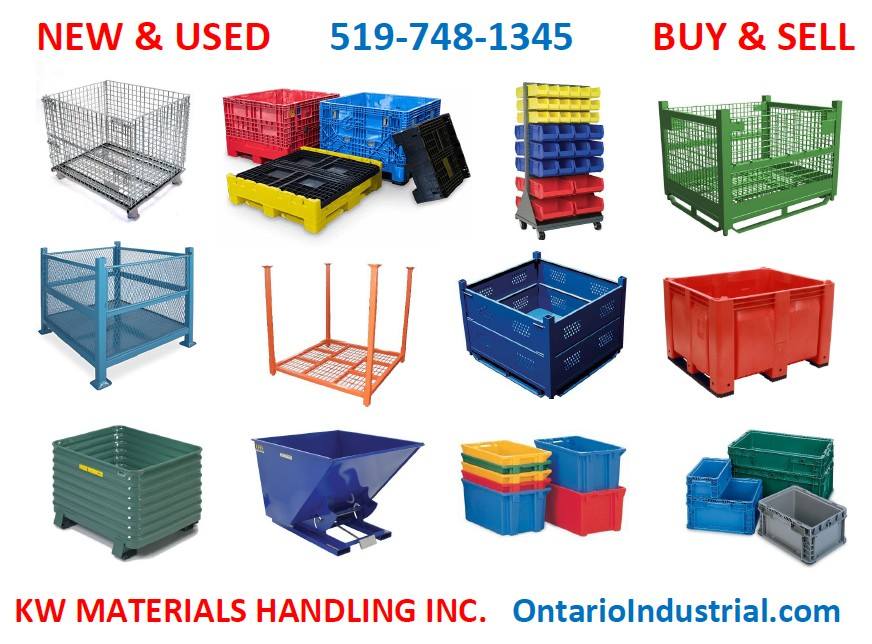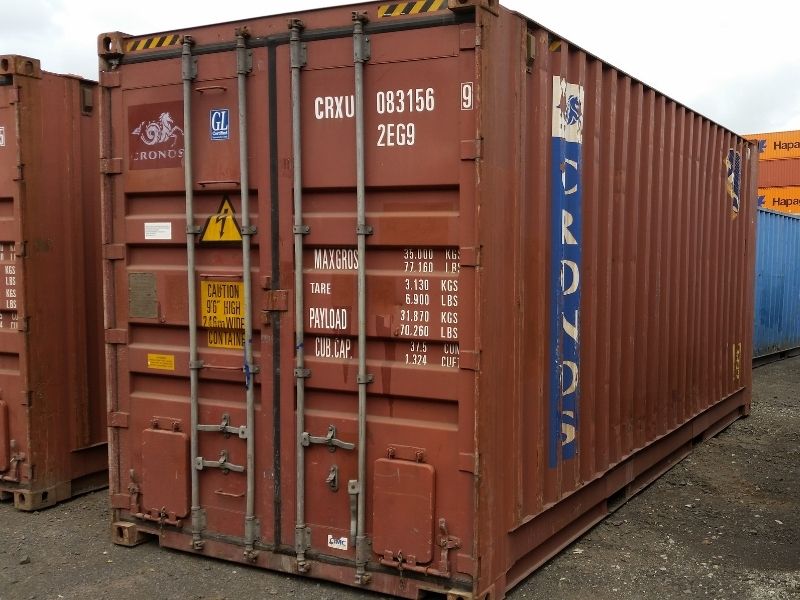Why refurbished bulk containers are smart solutions for sustainable businesses
Wiki Article
Why Mass Containers Are Essential for Sustainable and Cost-efficient Transportation
Bulk containers play an essential role in modern logistics. They help with the effective activity of huge amounts of items, thereby optimizing transportation procedures. This method not just minimizes prices yet also lessens ecological influence via lower exhausts and waste generation. As industries look for even more sustainable techniques, the adoption of mass containers is becoming progressively considerable. What ramifications does this shift hold for future logistics and supply chain administration?
The Benefits of Making Use Of Mass Containers in Logistics
Bulk containers transform logistics by boosting performance and sustainability. These containers enable for the transport of big amounts of items in a single trip, noticeably lowering the number of trips needed. This not just streamlines operations but likewise lessens labor prices related to handling, loading, and discharging. Furthermore, bulk containers are developed to enhance area usage within transport vehicles, ensuring that more items can be delivered all at once.The standardization of mass containers additionally streamlines the logistics procedure. With uniform dimensions, they can be quickly stacked and stored, resulting in boosted warehouse management. Moreover, bulk containers frequently feature durable products that secure components from damages during transit, therefore decreasing item loss and boosting total reliability. Consequently, companies can experience enhanced supply chain performance, inevitably causing raised success and consumer fulfillment. This combination of variables makes mass containers a vital possession in modern-day logistics.
Environmental Effect: Reducing Waste and Carbon Impact
As industries significantly prioritize sustainability, the adoption of bulk containers has become an essential approach for lowering waste and reducing carbon impacts. These containers minimize using product packaging products, such as boxes and plastic, therefore significantly reducing total waste generation. By consolidating shipments, bulk containers improve transportation performance, permitting for more items to be carried per journey. This reduction in trips directly correlates with lower greenhouse gas discharges, adding to a smaller sized carbon footprint.Mass containers can typically be recycled or recycled, even more alleviating ecological impact. The toughness of these containers warranties they can withstand several transport cycles, lowering the need for single-use options. refurbished bulk containers. By streamlining logistics and promoting efficient resource use, bulk containers not just support lasting techniques but also encourage industries to align with global environmental goals. Ultimately, their implementation reflects a commitment to ecological stewardship and liable source monitoring
Price Cost Savings: Exactly How Bulk Containers Lower Transport Costs
While lots of business seek methods to improve their lower line, making use of mass containers offers a considerable possibility for reducing transportation expenses. Mass containers make best use of the quantity of products carried, enabling companies to ship bigger quantities at the same time. This efficiency reduces the variety of trips needed, straight decreasing gas prices and lessening labor costs related to loading and dumping.Furthermore, mass containers usually feature streamlined styles that optimize room use within transportation vehicles. This means less vacant rooms, causing extra effective use available capability. Moreover, the resilience of bulk containers can decrease the risk of item damage throughout transit, making sure and decreasing losses that even more goods get here intact.
Enhancing Supply Chain Performance With Bulk Storage Space Solutions
Mass storage options play an important function in improving supply chain efficiency by enhancing supply management. By combining items right into fewer, larger containers, services can considerably lower handling expenses related to constant transfers and handling. This structured approach allows for much better tracking and management of stock, ultimately bring about enhanced operational performance.Structured Supply Administration
Reliable supply monitoring is important for enhancing supply chain procedures, particularly when organizations adopt bulk storage solutions. These solutions enable businesses to maintain greater stock levels while minimizing the regularity of replenishment. By settling products right into mass containers, firms can enhance their supply procedures, lowering the intricacy linked with tracking several smaller packages. This method helps with exact supply matters and enhances forecasting accuracy, enabling even more educated decision-making. On top of that, bulk storage space remedies simplify storage facility organization, making it less complicated to situate and gain access to products when required. Therefore, companies can achieve an extra reliable inventory turnover price, inevitably boosting general supply chain efficiency and lowering the probability of stockouts or overstock scenarios.
Lowered Handling Costs
The execution of bulk storage options not only improves supply administration yet additionally significantly minimizes handling prices throughout the supply chain. By combining materials into mass containers, firms lessen the demand for constant handling and transfer between different storage space and transportation devices. This method reduces down on labor expenses related to loading, unloading, and relocating smaller sized packages. Additionally, mass storage space lowers the frequency of shipments, resulting in reduced transport prices and reduced gas intake. Therefore, companies can enhance their logistics operations, permitting an extra reliable appropriation of resources. Eventually, lowered managing costs contribute to boosted overall supply chain effectiveness, promoting an atmosphere that sustains both sustainability and economic practicality.
Convenience of Bulk Containers Across Numerous Industries
Several industries have unique demands for transport and storage, bulk containers have actually arised as a functional solution that meets a broad variety of requirements. These containers, varying from huge bins to specialized tanks, can fit diverse materials, including granules, fluids, and powders. In the agricultural field, bulk containers help with the transport of plant foods and grains, while the food and beverage market uses them for components and ended up items. The chemical market depends on bulk containers for safely moving unsafe materials, ensuring compliance with security guidelines. Furthermore, building and construction companies profit from mass containers for transporting aggregates and other materials. Their adaptability includes numerous settings of transport, including trains, trucks, and ships, enhancing logistical efficiency. This versatility not just streamlines procedures across different fields yet likewise promotes sustainability by lowering product packaging waste and enhancing space en route. Bulk containers play an important duty in contemporary supply chain management.Future Fads in Bulk Container Use and Sustainability
The future of bulk container use is increasingly formed by innovative products advancement that enhances sustainability. Furthermore, automation in logistics promises to enhance operations, minimizing waste and boosting efficiency. Accepting circular more info economic situation techniques will certainly even more change exactly how bulk containers are designed, made use of, and recycled, cultivating a much more sustainable transport landscape.Innovative Products Growth
As markets increasingly focus on sustainability, innovative products development wholesale containers emerges as a substantial consider boosting environment-friendly transportation remedies. Scientists and makers are exploring naturally degradable plastics, recycled composites, and lightweight steels to lower environmental effect. These materials not only reduce waste however additionally improve fuel efficiency by reducing the general weight of containers. Additionally, improvements in clever products, which can adjust to varying conditions, improve the durability and functionality of bulk containers. The combination of these ingenious products aligns with round economy principles, advertising reuse and recycling. As the need for lasting methods expands, the development of such products will certainly play a vital role fit the future of mass container use in logistics and transport.Automation in Logistics
Substantial innovations in automation are positioned to change logistics and the use of bulk containers, boosting sustainability in transportation. Automated systems, including drones and independent vehicles, are improving the motion of bulk containers, decreasing the dependence on standard fuel-powered transport. These innovations enhance routing and filling procedures, minimizing empty miles and enhancing gas effectiveness. Additionally, automated supply administration systems improve tracking and surveillance of mass containers, making sure much better resource allotment and lowered waste. The combination of the Internet of Points (IoT) enables real-time data evaluation, allowing positive decision-making that aligns with sustainability objectives. As automation continues to advance, it is expected to drive further developments wholesale container use, inevitably sustaining even more lasting logistics practices and lowering the environmental influence of transportation.Round Economic Climate Practices
Developments in automation are establishing the stage for a more incorporated approach to round economy methods in the domain name of bulk container use. As sectors progressively welcome sustainability, bulk containers are being made for durability and reusability. This change not just minimizes waste however also improves source efficiency. Business are taking on strategies such as closed-loop systems, where made use of containers are gathered, reconditioned, and reestablished into the supply chain. Furthermore, clever technologies track container life cycles, promoting better management and minimizing ecological impact. The partnership in between suppliers, logistics companies, and end-users is essential in establishing criteria for sustainable container use. used collapsible containers. Future trends suggest a growing emphasis on materials that are recyclable and eco-friendly, further reinforcing the circular economy's principles in bulk transportation
Often Asked Inquiries
What Materials Are Bulk Containers Typically Made From?
Bulk containers are commonly constructed from long lasting products such as high-density polyethylene, cardboard, steel, and light weight aluminum. These materials offer versatility, security, and stamina, making them ideal for transferring different items in various sectors efficiently.How Do I Choose the Right Size Bulk Container?
Choosing the right size bulk container involves assessing the volume of materials to be moved, taking into consideration handling equipment compatibility, and appraising storage space requirements. Proper size warranties performance in transport and minimizes waste during delivery.Are Bulk Containers Reusable or Recyclable?
Bulk containers are typically multiple-use, created for multiple journeys, enhancing sustainability. Lots of can also be reused, relying on the products utilized. Picking recyclable alternatives better sustains ecological objectives and minimizes waste in transportation methods.What Security Rules Put On Mass Container Transportation?
Security regulations for mass container transportation consist of conformity with the Department of Transport guidelines, correct labeling of harmful materials, architectural stability assessments, and adherence to weight restrictions to ensure risk-free handling and avoid mishaps during transit.Just How Can Businesses Change to Making Use Of Mass Containers Successfully?
Organizations can alter to bulk containers by reviewing existing logistics, educating staff on handling, purchasing ideal devices, optimizing inventory administration, and collaborating with vendors to assure compatibility and effectiveness throughout the supply chain.
As sectors increasingly prioritize sustainability, the fostering of bulk containers has arised as an essential method for reducing waste and reducing carbon impacts. By combining materials right into bulk containers, firms can enhance their stock procedures, decreasing the intricacy linked with tracking multiple smaller plans. As industries progressively prioritize sustainability, ingenious products growth in bulk containers arises as a significant element in improving eco-friendly transportation services. Automated systems, including drones and self-governing automobiles, are simplifying the activity of mass containers, lowering the dependence on traditional fuel-powered transport. Additionally, automated stock administration systems improve tracking and monitoring of bulk containers, making certain better resource appropriation and decreased waste.
Report this wiki page